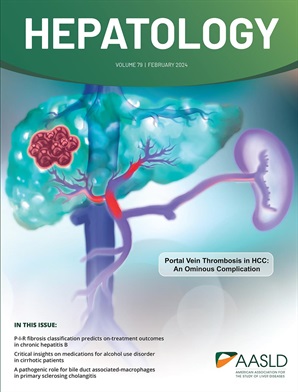Efficacious suppression of primary and metastasized liver tumors by polyIC-loaded lipid nanoparticles.
IF 15.8
1区 医学
Q1 GASTROENTEROLOGY & HEPATOLOGY
引用次数: 0
Abstract
BACKGROUND AND AIMS So far, there is no effective mechanism-based therapeutic agent tailored for liver tumors. Immune checkpoint inhibitors (ICIs) have demonstrated limited efficacy in liver cancer, often associated with severe adverse effects. Although poly-inosinic:cytidylic acid (polyIC) has shown an adjuvant effect when combined with anti-PD-L1 antibody (αPD-L1) in treating liver tumors in animal models, its systemic toxicity limits its clinical utility. To address this challenge, the original goal of this study was to develop a liver-targeted strategy to minimize toxicity. METHODS AND RESULTS We constructed lipid nanoparticles (LNPs) encapsulating polyIC for selective delivery to the liver and evaluated the tumor-suppressive effects of polyIC-LNPs, free polyIC, and/or αPD-L1 in multiple murine liver tumor models. We also analyzed changes in the hepatic immune microenvironment using single-cell RNA sequencing and flow cytometry. Surprisingly, polyIC-LNPs alone robustly suppressed both primary and metastatic liver tumors, independent of αPD-L1. Even a single dose of polyIC-LNPs was sufficient to control liver tumor progression. Primarily taken up by hepatocytes, polyIC-LNPs induced sustained type I interferon signaling, reshaped the hepatic immune landscape, and promoted CD8⁺ T cell infiltration and activation by enhancing the maturation of conventional dendritic cells (cDC1), ultimately resulting in a potent anti-tumor response. CONCLUSION Contrary to our original goal, we unexpectedly found that polyIC-LNPs function as an efficacious monotherapy tailored for liver cancer, capable of coordinately modulating antitumor immunity. This novel approach eliminates the need for ICIs, thereby addressing key limitations of current immunotherapies.载聚ic脂质纳米颗粒对原发性和转移性肝肿瘤的有效抑制。
背景和目的迄今为止,还没有针对肝脏肿瘤的有效的基于机制的治疗药物。免疫检查点抑制剂(ICIs)对肝癌的疗效有限,通常伴有严重的不良反应。虽然在动物模型中,多肌苷胞酸(polyIC)与抗pd - l1抗体(αPD-L1)联合治疗肝脏肿瘤显示出佐剂作用,但其全身毒性限制了其临床应用。为了应对这一挑战,本研究的最初目标是开发一种肝脏靶向策略,以尽量减少毒性。方法与结果我们构建了脂质纳米颗粒(LNPs)包裹polyIC选择性递送到肝脏,并在多种小鼠肝脏肿瘤模型中评估了polyIC-LNPs、游离polyIC和/或αPD-L1的肿瘤抑制作用。我们还使用单细胞RNA测序和流式细胞术分析了肝脏免疫微环境的变化。令人惊讶的是,polyIC-LNPs单独抑制原发性和转移性肝肿瘤,不依赖于αPD-L1。即使单剂量的polyIC-LNPs也足以控制肝脏肿瘤的进展。polyIC-LNPs主要由肝细胞吸收,诱导持续的I型干扰素信号传导,重塑肝脏免疫景观,并通过增强常规树突状细胞(cDC1)的成熟促进CD8 + T细胞的浸润和活化,最终导致有效的抗肿瘤反应。与我们最初的目标相反,我们意外地发现polyIC-LNPs作为一种有效的针对肝癌的单药治疗,能够协调调节抗肿瘤免疫。这种新方法消除了对ICIs的需求,从而解决了当前免疫疗法的主要局限性。
本文章由计算机程序翻译,如有差异,请以英文原文为准。
求助全文
约1分钟内获得全文
求助全文
来源期刊

Hepatology
医学-胃肠肝病学
CiteScore
27.50
自引率
3.70%
发文量
609
审稿时长
1 months
期刊介绍:
HEPATOLOGY is recognized as the leading publication in the field of liver disease. It features original, peer-reviewed articles covering various aspects of liver structure, function, and disease. The journal's distinguished Editorial Board carefully selects the best articles each month, focusing on topics including immunology, chronic hepatitis, viral hepatitis, cirrhosis, genetic and metabolic liver diseases, liver cancer, and drug metabolism.
 求助内容:
求助内容: 应助结果提醒方式:
应助结果提醒方式:


